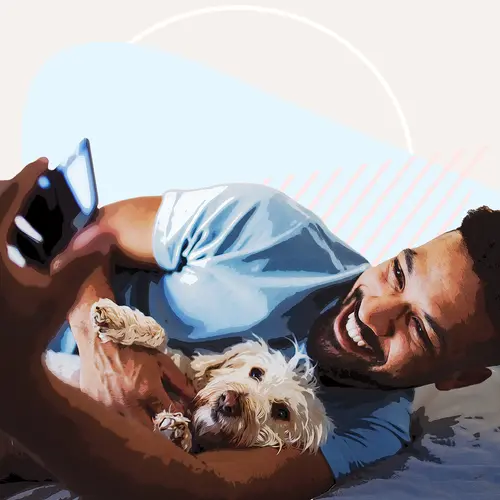We often think that dogs can feel the same way that we do. But there are times when it's hard to tell what your dog is feeling. Jealousy and possession might be hard to recognize. A jealous, possessive, and protective dog can bring trouble around other dogs. That’s why it’s best to identify the feeling first. but first, it's important to rule out any medical reasons for this and other behavior changes. Don't assume that it's jealousy.
What Is Jealousy in Dogs?
Your dog may not experience “jealousy” the same way that people do. Instead of jealousy, your dog may actually be acting assertive, pushy, or rude. That’s your dog’s way of establishing social hierarchy.
Though dogs may show human-like jealous behavior, they only do it as a reaction to their perceived social threat.
Dogs are skilled in using human communicative signals. This means that they can understand social cues and know how to follow pointing and eye gaze. This was found in a study where dogs found hidden food using human social cues. By watching our social cues, some dogs can pick up that they're not being rewarded or praised the same amount as their counterpart.
A dog's “jealous” behaviors may include:
- Snapping
- Getting between owner and other objects
- Behavior towards an object or thing you’re interacting with
- Extra attention to you
Behaviors you should watch out for include:
- Aggression. Any kind of nibbling or biting to get attention over another object or thing is a bad sign.
- Accidents inside. Since our pets can’t talk to us, they express themselves through their actions. Your pet can show you they’re upset by having accidents in the house.
- Growls and howls. If your dog purposely tries to scare away strangers or other animals, it may be because of jealous feelings.
Possessive Behavior
Possessive behavior can be very problematic or very little cause for concern, depending on your dog's actions. If your dog is turning their head away when you’re reaching for a toy, that’s not so bad. But if your dog is growling and biting at you as you approach them, that’s more serious.
Dogs can be possessive over their owners as well as their toys or food. This makes your dog extra protective of you and keeps your dog on high alert when there’s no real threat.
Your dog may be showing possessive behavior if they do the following:
- Growling
- Snapping
- Whining
- Attacking another pet or person
Understanding a Protective Dog
If your dog is acting protective, it's because that’s their natural instinct. This reaction may seem aggressive if your dog thinks you’re in danger. Sometimes protective instincts can get confused with jealous or possessive behavior.
Your dog is protective if they do the following:
- Focuses on another dog, person, or situation
- Gives their full attention to the scenario
- Relaxes and backs down after no threat is found
The key difference between a protective dog and a possessive dog is the relaxing and backing down. A possessive or jealous dog doesn’t typically back down. They’ll continue the problematic behavior the entire time they’re in an uncomfortable situation.
Changing Problematic Behavior
Don’t lose hope; you can still change unwanted behavior in your dog. First, you’ll need to reward your dog when they act the way you want them to. If your dog comes in between you and another person, just ignore them. If your dog keeps getting in the way, get up and move to another space. The following will help your dog know their behavior is unwanted:
- Don’t say anything to them
- Don’t touch them
- Don’t look at them
- Ignore bad behavior
To stop your dog’s jealous behavior early, you can try the following tips:
- Record examples that cause jealousy or aggression in your dog.
- Avoid giving too much attention to one pet over another.
- Train your dog to feel safe and relaxed in their crate.
- Make a separate feeding space for multiple animals.
- Don’t pet one of your animals to make others jealous purposely.
- Reward your dog when they’re exhibiting good behavior.
It’s essential to keep your dog entertained and healthy. By working proactively with your dog, you can avoid bad behavior. Your dog has physical and emotional needs that they require to feel fulfilled and happy.
If you’re concerned about your dog’s behavioral problems, you can always turn to a dog behavioral specialist. They’ll help you train your dog and get the bad behavior under control. The dog trainer will help you understand your dog and take charge.
